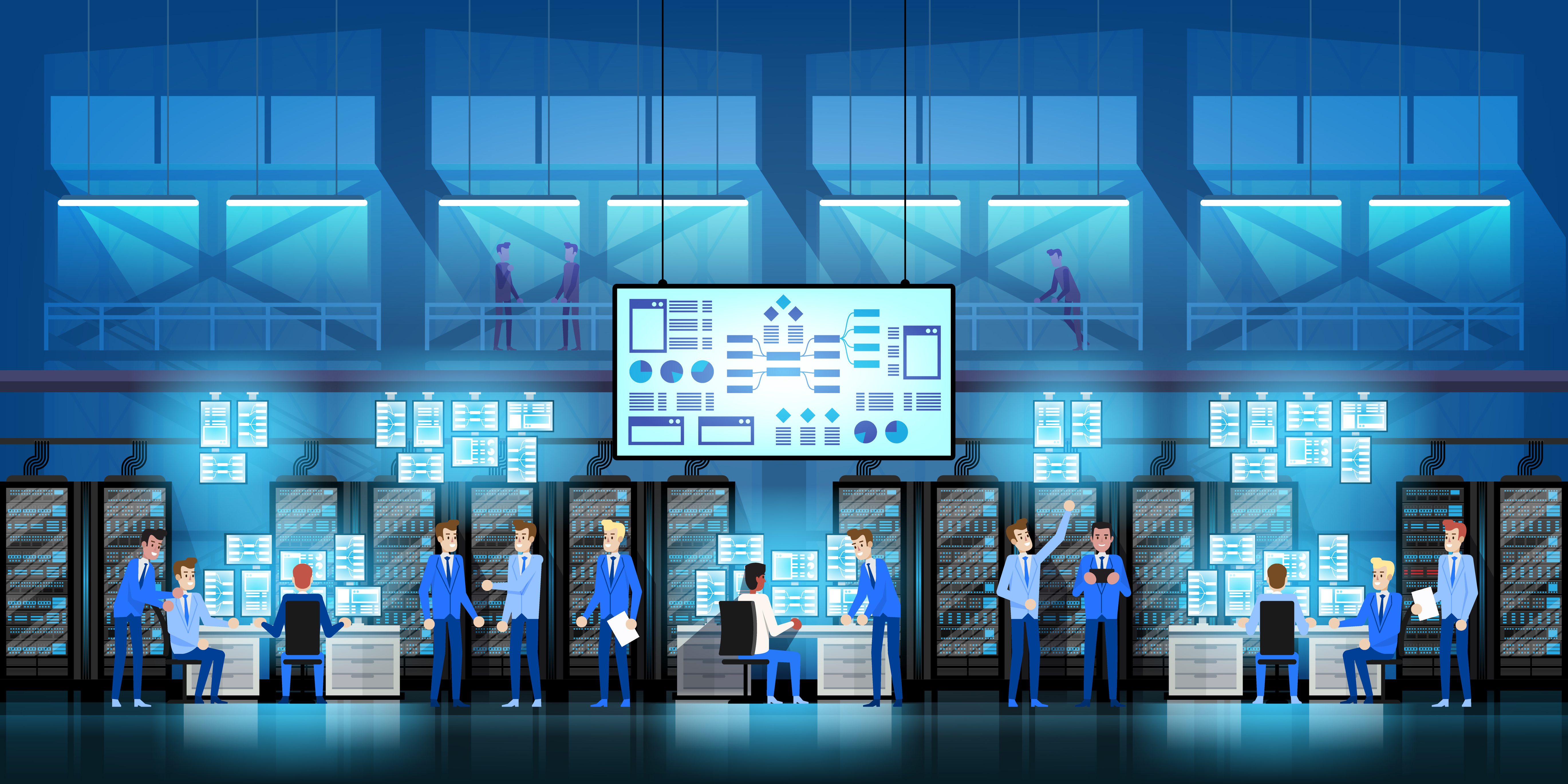Data Center Skills in High Demand in 2022
As modern data centers grow increasingly complex and distributed, data center technology and infrastructure can become more difficult to manage, and it becomes harder for IT decision-makers to find qualified candidates.
According to Uptime Institute, 50% of data center owners and operators are struggling to find qualified candidates.
In recent years, the COVID-19 pandemic has accelerated industry trends such as remote data center management, deepening the already severe data center skills gap.
Data center operations have been greatly affected by the increased security and performance risks that have arisen from the shift to a virtual presence for most businesses and institutions. As the pandemic continues into 2022, data centers are looking to hire those who possess the necessary talent to help bridge the data center skills gap and improve uptime, efficiency, and security.
Data center skills that will be in high demand in 2022 are:
- Cloud computing. Cloud computing involves the delivery of on-demand computing services through the storing and accessing of data and applications over the internet. This relatively new technology is gaining popularity across data centers and major technology firms, and it is constantly evolving. Since cloud computing has significant scalability capability, cloud architects are now desired more than ever. Cloud architects plan, design, develop, and migrate applications in the cloud. They also have a deep knowledge of architectural principles, software development, third-party integration, databases, networking, and enterprise security. Although cloud computing is typically viewed as being separate from a traditional data center, within the coming years, data centers are aiming to create a hybrid cloud to combine the best aspects of physical data centers and the cloud.
- Edge computing. By bringing computing resources close to the customer, edge computing optimizes services and applications and is becoming increasingly popular. As billions of devices will be connected to the internet soon, network architectures will need to be restructured to handle all of the data. With more edge infrastructure deployments, data centers will seek intelligent and cost-efficient ways to collect, analyze, and route data. System design, networking, database modeling, and security skills are critical as edge computing designs need to decrease latency and combat the increased security risks. According to Statista, edge computing is expected to be a $251 billion industry by 2022, so bringing these skills to data centers as soon as possible will provide an important competitive advantage.
- Integration and automation. Data center automation via integration has become an integral part of increasing efficiency and data accuracy. With legacy data center management tools such as Excel and Visio becoming obsolete, data center professionals must know automation tools such as Data Center Infrastructure Management (DCIM) software. While traditional management tools require excessive manual data entry and data is often siloed in disparate databases, data center managers are looking for those who are skillfully knowledgeable about automation. This knowledge can not only help cut costs but can also improve the accuracy and security of data. This is because automation delivers insight into server nodes and configurations, automates routine procedures, produces and programs scheduling and monitoring tasks, and also enforces processes and control in agreement with data center standards. There are numerous ways to automate a data center, including provisioning and orchestration, virtual machine data management, device state tracking, and parts management. Additionally, there are many notable practices to successfully integrate second-generation DCIM software with other tools such as ServiceNow, BMC, Cherwell, VMware, and many more.
- Security. Security is one of the most critical aspects of a data center as there are constant threats of data breaches or cyberattacks. Data centers hold a large amount of sensitive information such as intellectual property, customer data, and financial records, so any security risk can be detrimental to the success of the data center. As billions of devices are connected to the internet today, data center security has been made even more difficult. With a growing shift towards an online environment as a result of the COVID-19 pandemic, data center managers are looking for people who are notably skilled in cybersecurity. Current security specialists are focused on detecting and acting against threats in the network, workloads, or applications. However, current security goals involve using automated tools to detect anomalies in the network to proactively protect the facility. There will also be an increased need for cybersecurity architects who can create a centralized threat perception model to monitor the security of the facility on a larger scale. It is important to be able to use network intelligence to encourage undisturbed performance, analyze data, and automate functions without creating security risks. In addition to cyber threats, physical threats remain a major cause of concern. Data center professionals must know and follow data center physical security best practices such as using electronic door locks and card access control, role-based permissions, and more.
- Hybrid IT management. There has been a recent shift from traditional, on-premise data centers to a hybrid data center model that utilizes technologies such as virtualization, the cloud, and software-defined networking. A hybrid data center allows for greater IT efficiency, automation, and agility. Data centers will need skillful hybrid IT managers who can successfully manage all the aspects of a hybrid data center. Proficiency in services such as Amazon Web Services, Microsoft Azure, and Google Cloud Platform is now highly needed by many of today’s IT organizations.
- Data-driven decision-making. Data center managers must be able to leverage data to improve capacity planning, increase efficiency, and maintain data center uptime. Data-driven decision-making (DDDM) is the process of using data analytics to make organizational decisions as opposed to acting upon intuition, anecdotes, or observations. It involves using facts, data center key performance indicators (KPIs), and other data to make more accurate decisions, and requires great knowledge of the ins and outs of data center management. Whereas DDDM has typically been carried out using enterprise data analytics applications such as TeraData or Microsoft Power BI, or even more basic programs such as Microsoft Excel, the data center business intelligence and analytics capabilities found in second-generation DCIM software have made it even easier to get actionable information from data in the form of zero-configuration dashboard charts, reports, and visual analytics. Data can be securely shared among key stakeholders to drive a culture of data-sharing and data-driven collaboration to make the best decisions for the data center. According to the MIT Center for Digital Business, organizations driven by DDDM saw a 4% higher productivity rate and 6% higher profits than those who were not driven by DDDM.
- Data Center Infrastructure Management (DCIM) software. Theuse of second-generation DCIM software has become widely popular as it continues to achieve quantifiable and fast ROI for modern data center managers, such as 40% more usage out of facilities and power sources. DCIM software allows for more efficient and effective data center management and monitoring and encompasses many aspects of a data center, such as asset, capacity, power, environment, and connectivity, that can result in cost savings, downtime avoidance, and more effective disaster prevention measures. The DCIM market has seen incredible growth in recent years. Therefore, instead of wasting time learning legacy management tools such as Excel and Visio that will inevitably become obsolete, knowledge of DCIM software will be a very useful skill in 2022.
How to Bridge the Data Center Skills Gap in 2022
It is no secret that data centers were forced to make drastic changes to their operations to ensure the security and success of their systems. In the future, data centers need to continue to pursue innovations to remain prepared for any major changes, or even crises, that may arise from external sources.
To stay up-to-date and have the most efficient data center possible, it is important for prospective data center hires to be proficient in at least one of the skills mentioned above. However, a lot of these skills can be made easier with second-generation DCIM software. Although knowledge of Excel, Visio, and legacy management tools was previously sought after, DCIM software has replaced these applications and offers ease of use, a complete suite of capabilities, compatibility with what you have, extreme scalability, and much more.
To learn about the top data center training and certifications that will help you learn the most important data center skills for modern professionals, read our Top Data Center Training and Certifications infographic.
Want to learn how Sunbird’s world-leading DCIM software can help you expand your knowledge of data center management? Get your free test drive today!





























